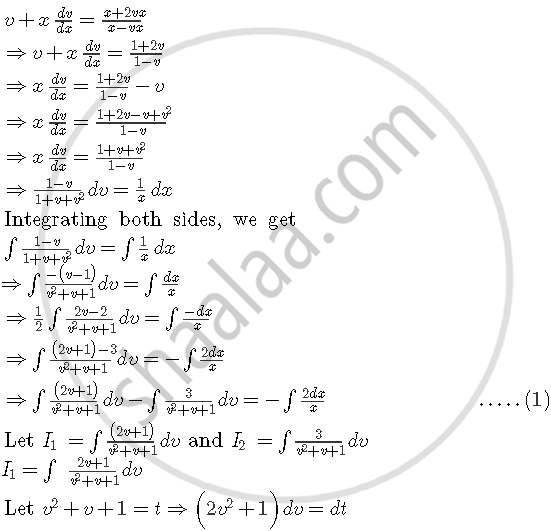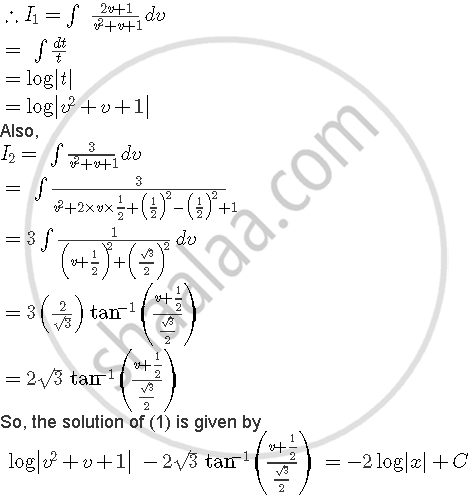Advertisements
Advertisements
प्रश्न
Find the particular solution of the differential equation `(x - y) dy/dx = (x + 2y)` given that y = 0 when x = 1.
उत्तर १
`dy/dx = (x + 2y)/(x - y)`
Putting y = Vx


उत्तर २
The given differential equation is
`(x - y) dy/dx = x + 2y`
`=> dy/dx = (x + 2y)/(x - y)`
This is a homogeneous differential equation.
Putting y=vx and `dy/dx = v + x dy/dx`, we get



संबंधित प्रश्न
Solve the differential equation (x2 + y2)dx- 2xydy = 0
Find the particular solution of the differential equation:
2y ex/y dx + (y - 2x ex/y) dy = 0 given that x = 0 when y = 1.
Show that the given differential equation is homogeneous and solve them.
`x^2 dy/dx = x^2 - 2y^2 + xy`
Show that the given differential equation is homogeneous and solve them.
`x dy - y dx = sqrt(x^2 + y^2) dx`
Show that the given differential equation is homogeneous and solve them.
`x dy/dx - y + x sin (y/x) = 0`
For the differential equation find a particular solution satisfying the given condition:
(x + y) dy + (x – y) dx = 0; y = 1 when x = 1
For the differential equation find a particular solution satisfying the given condition:
`dy/dx - y/x + cosec (y/x) = 0; y = 0` when x = 1
For the differential equation find a particular solution satisfying the given condition:
`2xy + y^2 - 2x^2 dy/dx = 0; y = 2` when x = 1
Prove that x2 – y2 = c (x2 + y2)2 is the general solution of differential equation (x3 – 3x y2) dx = (y3 – 3x2y) dy, where c is a parameter.
Prove that x2 – y2 = c(x2 + y2)2 is the general solution of the differential equation (x3 – 3xy2)dx = (y3 – 3x2y)dy, where C is parameter
(x2 − 2xy) dy + (x2 − 3xy + 2y2) dx = 0
(x2 + 3xy + y2) dx − x2 dy = 0
Solve the following initial value problem:
(x2 + y2) dx = 2xy dy, y (1) = 0
Solve the following initial value problem:
x (x2 + 3y2) dx + y (y2 + 3x2) dy = 0, y (1) = 1
Solve the following initial value problem:
\[\left\{ x \sin^2 \left( \frac{y}{x} \right) - y \right\}dx + x dy = 0, y\left( 1 \right) = \frac{\pi}{4}\]
Solve the following initial value problem:
\[x\frac{dy}{dx} - y + x \sin\left( \frac{y}{x} \right) = 0, y\left( 2 \right) = x\]
Solve the following differential equation : \[\left[ y - x \cos\left( \frac{y}{x} \right) \right]dy + \left[ y \cos\left( \frac{y}{x} \right) - 2x \sin\left( \frac{y}{x} \right) \right]dx = 0\] .
Solve the following differential equation:
`(1 + "e"^("x"/"y"))"dx" + "e"^("x"/"y")(1 - "x"/"y")"dy" = 0`
Solve the following differential equation:
`"xy" "dy"/"dx" = "x"^2 + "2y"^2, "y"(1) = 0`
Solve the following differential equation:
`"x"^2 "dy"/"dx" = "x"^2 + "xy" + "y"^2`
State whether the following statement is True or False:
A homogeneous differential equation is solved by substituting y = vx and integrating it
F(x, y) = `(x^2 + y^2)/(x - y)` is a homogeneous function of degree 1.
The solution of the differential equation `(1 + e^(x/y)) dx + e^(x/y) (1 + x/y) dy` = 0 is
Let the solution curve of the differential equation `x (dy)/(dx) - y = sqrt(y^2 + 16x^2)`, y(1) = 3 be y = y(x). Then y(2) is equal to ______.
Find the general solution of the differential equation:
(xy – x2) dy = y2 dx
